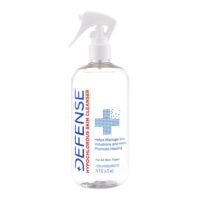Wondering how to prevent herpes?
It's easy to prevent herpes once you understand how it works. The virus is transmitted through direct contact with an active lesion or bodily fluid of an infected person. Herpes skin infection transmission occurs between discordant partners; a person with a history of the infection (HSV seropositive) can pass the virus to an HSV seronegative person. There are no documented cases of infection via an inanimate object (e.g., a towel, toilet seat or drinking glass). To infect a new individual HSV travels through tiny breaks in the skin or mucous membranes in the mouth or genital areas. Even microscopic abrasions on mucous membranes are sufficient enough to allow the virus to enter the bloodstream.
HSV asymptomatic occurs at some time in most individuals infected with herpes. It can happen more than a week before or after a significant event in 50% of cases. Infected people that show no visible symptoms may still “shed” and transmit the virus through their skin. Asymptomatic shedding may represent the most common form of HSV-2 transmission. Asymptomatic shedding is more frequent within the first 12 months of acquiring HSV. Concurrent infection with HSV increases the frequency and duration of asymptomatic shedding.
Do condoms prevent herpes?
Protective barriers, such as a condom or dental dams, can reduce the risk of herpes transmission in some cases.
For genital herpes, condoms are highly effective in preventing herpes transmission. The virus cannot pass through latex, but the effectiveness of a condom is somewhat limited. On a public health scale, their use is limited in the community, and on an individual scale because the condom may not wholly cover blisters on the penis of an infected male, or the base of the penis or testicles not covered by the condom may come into contact with free virus in vaginal fluid of an infected female. In such cases, abstinence from sexual activity or washing of the genitals after sex is recommended. The use of condoms or dental dams also limits the transmission of herpes from the genitals of one partner to the mouth of the other (or vice versa) during oral sex. When one partner has a herpes simplex infection, and the other does not, the use of antiviral medication, such as valaciclovir, in conjunction with a condom, further decreases the chances of transmission to the uninfected partner. Topical microbicides which contain chemicals that directly inactivate the virus and block viral entry are currently being investigated. Vaccines for HSV are presently under clinical studies.
Remember a few things can trigger recurrence and one must know some herpes prevention tips. These include stress, sunlight, weak immune system, tight-fitting clothes, hormonal changes such as during menstrual cycle, cold, surgery and lifestyle.
